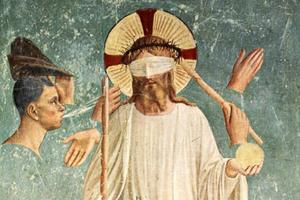An Exorcist and Psychiatrist Share Suggestions for Marriages
Here are 12 habits to help you, by the grace of God, “stay the course.”

No one should stay in a marriage that poses a threat of danger, but otherwise staying and working at the relationship can bear great fruit. Msgr. John Esseff, a priest and exorcist from Scranton, Pennsylvania, understands both the difficulties of married love and the importance of it within the family. His own parents often struggled with achieving a loving union. He relates a story of how the love of Christ is linked to marital love.
My mother had a picture of the Sacred Heart of Jesus above her bed. One night, she told me that she prayed, ‘Sacred Heart of Jesus, I want to love you more. Show me how to love you more.’
My mother went to bed and saw a vision of Jesus. This is what she later told me: ‘It was the image of Jesus that came to me in a rising vision. At first, I saw his pierced feet and flowing white robe. I kissed his feet and his pierced hand. When Jesus revealed to me his Sacred Heart, I almost fainted. Then, when I looked up to see his face, I saw your father’s face. Then, I understood. I had asked Jesus to show me how to love him more and he was telling me to love my husband more.’
Staying the Distance
I’ve been married for over 35 years and know many happily married couples—my husband and me included—that made it through rough spots, some of which seemed crater-like at the time. And I know many couples who divorced for a lot less. In that way, there is something to be said for endurance and sticking it out for better days. Research bears that out.
Last year, a study published in the journal Social Networks and the Life Course examined information on 2,034 married people and found that over the long haul—20-plus years—marriages stabilized. Couples tended to engage in more shared activities once their children got older and had developed deeper levels of appreciation for one another.
This is consistent with a 2012 study that found couples who were in their first year of marriage were unhappier than those who had been together for over 40 years. Researchers attributed it to the "marriage hangover" — a term for the moment that all of the festivities are over, and the work really begins.
There is more involved in a happy marriage than just letting the dust settle, but science, even without religion, indicates that staying the course has great value. The Catholic teaching is that marriage is a sacred, lifelong union with the mission of sharing mutual love, raising children and helping each other and their children attain eternal life. This is in contrast to a culture that pushes your own self-fulfillment as opposed to the Catholic goal of working to love as Christ loves.
12 Tips for Better Marriages
Dr. Richard Fitzgibbons, a psychiatrist who is the director of the Institute for Marital Healing outside Philadelphia, has worked with hundreds of Catholic couples over the past 40 years. His goal for them in never just endurance but rather for them to flourish. He is the co-author of Forgiveness Therapy: An Empirical Guide for Resolving Anger and Restoring Hope and his new book is Habits for a Healthy Marriage: A Handbook for Catholic Couples. In it, he shares 12 habits that can greatly strengthen all marriages.
- Forgiveness reduces anger by the loyal effort to understand oneself and one’s spouse and to engage in the demanding work of mastering irritability.
- Generosity conquers selfishness through growth in self-giving and in thinking many times daily, “we, not me.”
- Respect overcomes the urge to control by thinking about the dignity of one’s spouse and children.
- Responsibility closes emotional distance by committing to protect one’s spouse from loneliness, anxiety, insecurity and selfishness.
- Trust calms anxiety through confidence in the goodness and protection of God and of one’s spouse and through forgiving those who damaged trust.
- Hope reduces sadness by trusting in a positive outcome for events and circumstances in one’s life, especially the struggle with loneliness.
- Gratitude builds confidence through an appreciation of one’s God given gifts and of the gifts acquired from each parent and through forgiveness of those who damaged confidence.
- Prudence improves communication by helping spouses see what needs to be said or done in a given situation and how to say or do it.
- Temperance restrains compulsions and infidelity by moderating the attraction of pleasures and by mastering instincts and desires so that they remain loyal to one’s spouse.
- Justice prevents divorce by strengthening spouses to give what is due to God, their spouses and their children which is to work on honestly facing and resolving their personality and spiritual weaknesses.
- Loyalty is an unswerving desire for the best for others which decreases the retreat from commitment by recognizing the only place in which authentic human love and sexuality are realized is in marriage.
- Humility fosters self-knowledge and the process of addressing weaknesses acquired from one’s parents and from one’s mistakes that interfere with marital love and happiness.
Obviously, struggling relationships need more than just tips. Good books, therapy, and a marriage retreat can help. And always pray —together if you can—for God to make up for what is lacking.
Sacred Heart of Jesus, Give us the grace we need to for a holy marriage, strength for the crosses, kindness and mercy when we feel let down, forgiveness for our own failings, healing for hurts we’ve caused to our spouse and children, and an infinite love for each other. Amen.


















